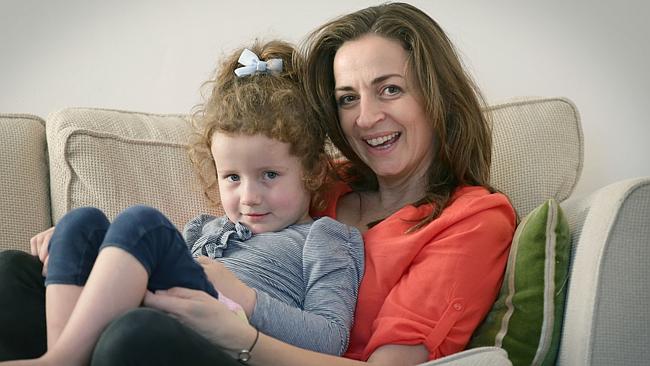
Janet Gillespie and daughter Charlotte Bishop. Pic Jamie Hanson Source: News Limited
CHARLOTTE Bishop looks like any other little girl.
A head full of brown curls frames a big grin as the four-year-old squeezes her brand new kitten, Maisie.
It’s not until this little girl tries to speak that you would notice anything different.
A series of unintelligible noises pour out of her mouth, noises that her mother, Janet Gillespie, has learnt to decipher over the years.
“She’s saying she got a new cat,” Ms Gillespie says, pushing a wayward curl behind her daughter’s ear.
Charlotte was diagnosed with moderate to severe Childhood Apraxia of Speech when she was just two and a half years old.
The rare neurological disorder manifests in completely normal brain function but extremely delayed speech.
Her mother teaches ballet to 2-5 year olds each week and is constantly flooded with stories from her talkative students.
“I often think Charlotte must have so many things that she wants to say to me but it’s just the bare minimum to get her through the day,” she says.
“It is really hard on her because she’s working a part of her brain that doesn’t work properly,” she says.
Charlotte was diagnosed in December 2012, after a specialist noticed her speech wasn’t developing at a normal rate.
“I had never heard of it before and there were so many different fears that went through my mind like is she ever going to be ok? Will she ever talk? Can she still go to school?” Ms Gillespie says.

Charlotte Bishop has speech apraxia, a condition that manifests in normal cognition but severe speech delays and muscle tone loss. Pic Jamie Hanson Source: News Limited
Each day brings a new set of challenges as mother and daughter navigate their way through simple tasks like choosing breakfast, getting dressed or going to kindergarten.
“It’s just heartbreaking not being able to understand your own child when you know they’ve got so much that they want to say,” Ms Gillespie says.
Suddenly, Maisie jumps across her owner and onto the television remote.
Sharp white noise blares from the speakers and Charlotte and Janet burst into laughter – the pair never let anything get in the way of having fun together.
Experts recommend early intervention for apraxic children including 3-5 sessions of speech therapy each week.
Ranging from $75-$90 per session, parents can face bills of up to $450 to get their children the right help.
Ms Gillespie has been denied the government carers allowance three times, despite working part-time and her daughter requiring intensive therapy.
“I make sure Charlotte still has her home, her garden and her therapy but anything else is a bonus,” she says.
Charlotte’s speech pathologist Rachel Ramsden says apraxic families often miss out on government benefit schemes.
“Centrelink defines a ‘disability’ if the condition last more than twelve months,” Ms Ramsden says.
“Children with apraxia go on to have difficulties with literacy at school because they don’t have those speech sounds, it’s not just one therapy session to cure them, these are long-term kids.”
“Apraxic kids are falling through the cracks and it makes it so difficult for parents to access the help they need.”
According to Ms Ramsden, apraxic children can “languish” on community health waiting lists for up to 12 months, delaying their treatment even longer.
“Even then kids may not even get the appropriate therapy because some therapists aren’t familiar with apraxia.”

Janet Gillespie and daughter Charlotte Bishop. Pic Jamie Hanson Source: News Limited
“For parents it’s awful because one of the earliest things kids do is babble away and try words.”
“There’s nothing greater than hearing your child try to say banana and having a giggle but apraxic kids don’t got through that because their speech is so delayed for so long.”
For Janet, her home has been silent for a long time.
“It was really lonely because you don’t have any banter. It was literally just about going to therapy to try and get sounds out of her,” Ms Gillespie says.
“The other day we spent an hour trying to get her to say how old she was and I think she may have said it once.”
The simplest phrase shared between a parent and their child is something that Janet looks forward to hearing the most.
“I will wait a lifetime to hear ‘I love you mum’,” she says.
“I say it to her all the time and she will look at me as though she wants to say it back, so we sound it out to each other,”
“She wants to say it but it’s just mimicking – I know the meaning is there though.”
Charlotte will begin prep in 2016 and her mother worries every day that her peers won’t understand her in class.
“I’m scared of her being bullied. She’s such an amazing, beautiful thing in my eyes that I don’t ever want her to go through any kind of hurt,” Ms Gillespie says.
But the most common fear shared by parents is the one that terrifies Janet the most.
“I live in fear she will get lost. She wouldn’t be able to tell anyone her name, let alone where she lives,” Ms Gillespie says.
“It would be so upsetting knowing that she would be trying desperately to say her name and where she lives, it’s just horrible to even think about.”
While the road ahead seems long, Ms Gillespie couldn’t imagine any other.
“It’s a very slow, frustrating journey but everyone has their battles, this is ours and we’re doing alright.”
